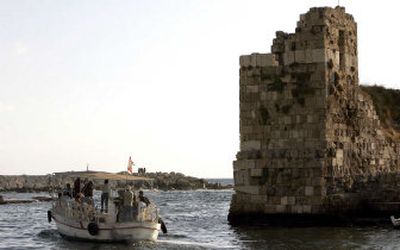Oil cleanup will begin soon at castle in Lebanon

BYBLOS, Lebanon – Cleanup is set to begin within days at the first of three ancient World Heritage sites damaged in the summer’s Hezbollah-Israel war – a crumbling old castle rising from the Mediterranean whose foundation stones are now coated with oil sludge.
Tens of thousands of dollars from European and other donors will go toward repairing the damage at the three sites – first at this ancient Phoenician port city whose history stretches back 7,000 years, then to Roman ruins at Baalbek and Roman-era frescos in Tyre.
But officials say they also worry that many other historic sites, such as old souks, or markets, not listed by UNESCO as World Heritage sites, also were damaged and are getting less attention.
In Byblos, once teeming with fishermen and tourists, the famous ruins of the crumbling castle-fortress, which have provided the backdrop for dozens of international concerts, are now blackened at the base with scum from an oil spill. The oil spilled after Israeli airstrikes hit fuel storage tanks on Lebanon’s coast in July, during the war against Hezbollah.
The cost of the cleanup could be around $100,000, and the work is expected to start within days after money arrives and coordination with Lebanese officials is completed, said Mounir Bouchenaki, who headed a UNESCO team that traveled to Lebanon to inspect the sites after the Aug. 14 cease-fire.
Byblos, one of the oldest inhabited cities in the world, has been linked to the legends and history of the Mediterranean region for thousands of years and is directly associated with the history and diffusion of the Phoenician alphabet. The English word Bible is believed to be derived from Byblos, meaning “the papyrus,” or “the book.”
The charming harbor town is a major tourist site where international summer festivals are held every summer.
Other challenges await.
Down the southern coast at Tyre, valuable frescoes in a Roman-era tomb were shaken to the ground. And inland, a block of stone at the Roman ruins of Baalbek was toppled. In addition, already existing cracks in the temples of Jupiter and Bacchus at Baalbek may have widened because of vibrations from bombings in the area, says the UNESCO team and Lebanese officials.